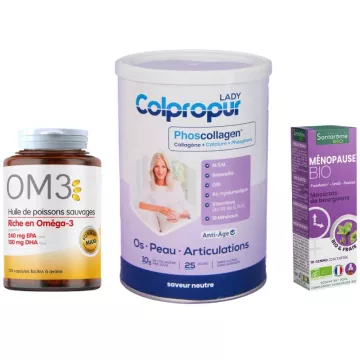





What are hot flushes and what are their main symptoms?
Hot flushes are sudden sensations of intense heat, mainly in the face, neck and chest, which can be accompanied by flushing, sweating, and sometimes palpitations or feelings of anxiety. These symptoms can occur at any time of the day or night, considerably disrupting the quality of life of those concerned.
What causes hot flushes?
Although most hot flashes are associated with the menopause and the hormonal imbalances it brings, they can also be caused by other factors such as stress, certain medications, obesity, alcohol and caffeine consumption. Identifying the underlying cause is crucial to adopting the most appropriate treatment.
How can hot flushes be prevented?
Preventing hot flashes involves a number of lifestyle adjustments:
What treatments are available for hot flushes?
Can hot flushes be completely eliminated?
Although it's difficult to completely eliminate hot flashes, their intensity and frequency can be significantly reduced through a combination of medical treatments, natural remedies and lifestyle changes. A personalized approach, tailored to each individual's needs and situation, is often the most effective.
Which plants can help relieve hot flushes?
Phytotherapy is a particularly popular natural solution for limiting menopausal symptoms. Certain plants are recognized for their hormone-regulating action or cooling effect:
Are there dietary supplements effective against hot flushes?
Yes, many natural supplements based on adaptogenic plants or rich in phytoestrogens can help. Combination formulas are often more effective, for example combining :
Caution: it is essential to consult a health professional before starting a cure, especially if you have a hormonal history or are undergoing medical treatment.
How can I prevent night-time hot flushes?
Nocturnal hot flashes, also known as night sweats, considerably disrupt sleep and quality of life. Here are a few tips to help alleviate them:
Certain supplements, such as melatonin, combined with adaptogenic plants, can help restore restful sleep.
Does stress play a role in the onset of hot flashes?
Absolutely. Chronic stress disrupts the hypothalamic-pituitary-adrenal axis, which indirectly impacts thermal regulation. A stressed woman is often more sensitive to variations in body temperature.
Stress management techniques such as cardiac coherence, meditation, yoga andacupuncture can significantly reduce the frequency of hot flushes.
Can hot flushes be relieved without hormones?
Yes, and many women do. In addition to HRT (hormone replacement therapy), several natural approaches are recommended:
These methods are particularly suited to women with contraindications to HRT, or those seeking a more natural, holistic approach.
When should I consult a healthcare professional?
It is advisable to consult a health professional if :
A hormonal assessment may be proposed to adjust management and check whether the flushes are indeed related to menopause or another imbalance.